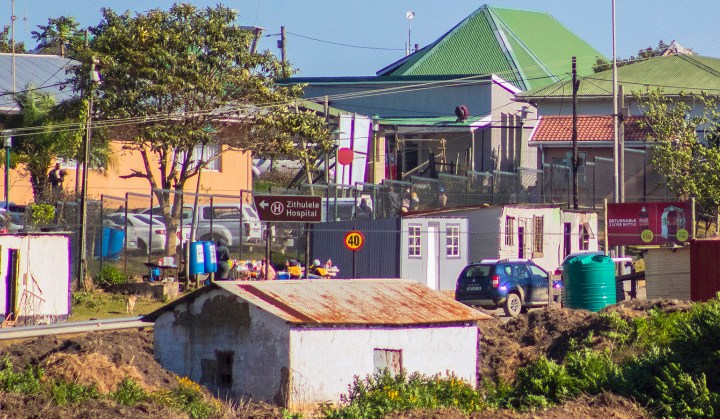ADVOCACY PROJECT
Protecting rural health must be a priority in times of economic turmoil – new report

The government should work strategically to protect its constitutional obligation to provide essential and emergency health services in rural areas, especially during difficult economic times, says a report published this week by the Rural Health Advocacy Project.
As South Africa deals with a difficult economic time, the government can implement several strategies to safeguard healthcare services in rural areas, a report from the Rural Health Advocacy Project advises.
The report was launched on Thursday. One of the report’s co-authors, Russell Rensburg, said South Africa finds itself in a difficult and interesting time.
“I have been thinking a lot about equality,” Rensburg said, highlighting how the Covid-19 pandemic revealed the inequalities in the South African health system.
“The reality is that rural people have poorer healthcare,” he said, adding that the South African government consistently underfunded healthcare.
“The economic outlook for the medium term suggests that the government will continue with its current austerity posture for the foreseeable future. Under these circumstances, it makes sense to consider strategies that can be used to counter the impact of austerity on the provisioning of health services,” the report reads.
“Regardless of the prevailing economic environment, it remains a constitutional obligation for the government to provide health services on an equitable and sustainable level. In this regard, no efforts should be spared to redesign and re-engineer services with the view to maintaining or even improving current levels of delivery.”
The report further highlights that there are specific hurdles in delivering rural healthcare. These include a lack of health facilities and infrastructure, poor communication infrastructure, a shortage of critical human resources and inadequate transport.
“Introducing spending cutbacks during times of austerity amounts to adding insult to injury for this already vulnerable section of society,” the report says.
It suggests that strategies can be implemented to protect vulnerable populations against the negative implications of austerity. These include prioritisation.
“I am of the view that we cannot afford the system we have,” Rensburg said, arguing that the health system should first attend to high-priority services before expanding to low- and medium-priority services. He said this should include strengthening primary healthcare above hospitals, as delays in basic healthcare treatments have costly consequences.
“We would prioritise essential life-saving technology over nice-to-have technology,” he said. This strategy should include using open-source software over software that requires expensive licensing fees.
“The efficient delivery of health services depends on the availability of supporting infrastructure and services, which in many instances, fall outside the mandate of the Department of Health. These include roads and access to water, both critical to the delivery of health services,” the report explains.
Visit Daily Maverick’s home page for more news, analysis and investigations
Conditional grants
The report’s co-author, Dr Claire Botha, suggests conditional grants can be helpful to protect rural healthcare in the current difficult economic times.
“Conditional grants are mechanisms through which national government departments can make direct interventions in provincial and local spheres of government. The purpose of conditional grants is to provide additional funding for priority areas where the grant recipient cannot provide for it through the ordinary equitable share or localised revenue streams. While many national government departments provide conditional grants, often targeting the same purpose, it is often the case that their efforts are not coordinated,” the report says.
“The advent of the NHI [National Health Insurance] presents an opportune moment to introduce reforms of an innovative nature which can impact the provisioning of health in a fiscally sustained manner. The District Allocation Formula, which will be introduced by the NHI specifically, can be used to ensure that the funding of rural health happens equitably and sustainably.”
Rensburg said he hoped the report would encourage debate.
Matshidiso Lencoasa, a budget researcher at SECTION27, said women would disproportionately carry the burden of declining investments in public health — even more so in rural areas, and more acutely in women-headed households.
She highlighted that stock-outs of contraceptives, for instance, constitute 40% of all medicine shortages in the public sector. Lencoasa also pointed out that women are most affected by nutritional deficiencies due to food shortages, droughts and flooding.
Mabalane Mfundisi from the South African National Aids Council said rolling blackouts had worsened things.
“We cannot continue to analyse [the situation] and do nothing to overcome. We must empower civil society leaders to raise these issues,” he said. Mfundisi added that it had been five years since the Presidential Health Compact, and nothing significant had happened since then.
Development economist Fundiswa Ndlela said Covid-19 laid bare the health system’s inequalities and collapsing state.
“Why has the national health system not been implemented?” she asked.
She also highlighted the impact of rolling blackouts on health facilities, saying that many patients were turned away when the power is off.
“Malnutrition will further worsen the current healthcare crisis,” she warned. DM/MC




















 Become an Insider
Become an Insider
Comments - Please login in order to comment.